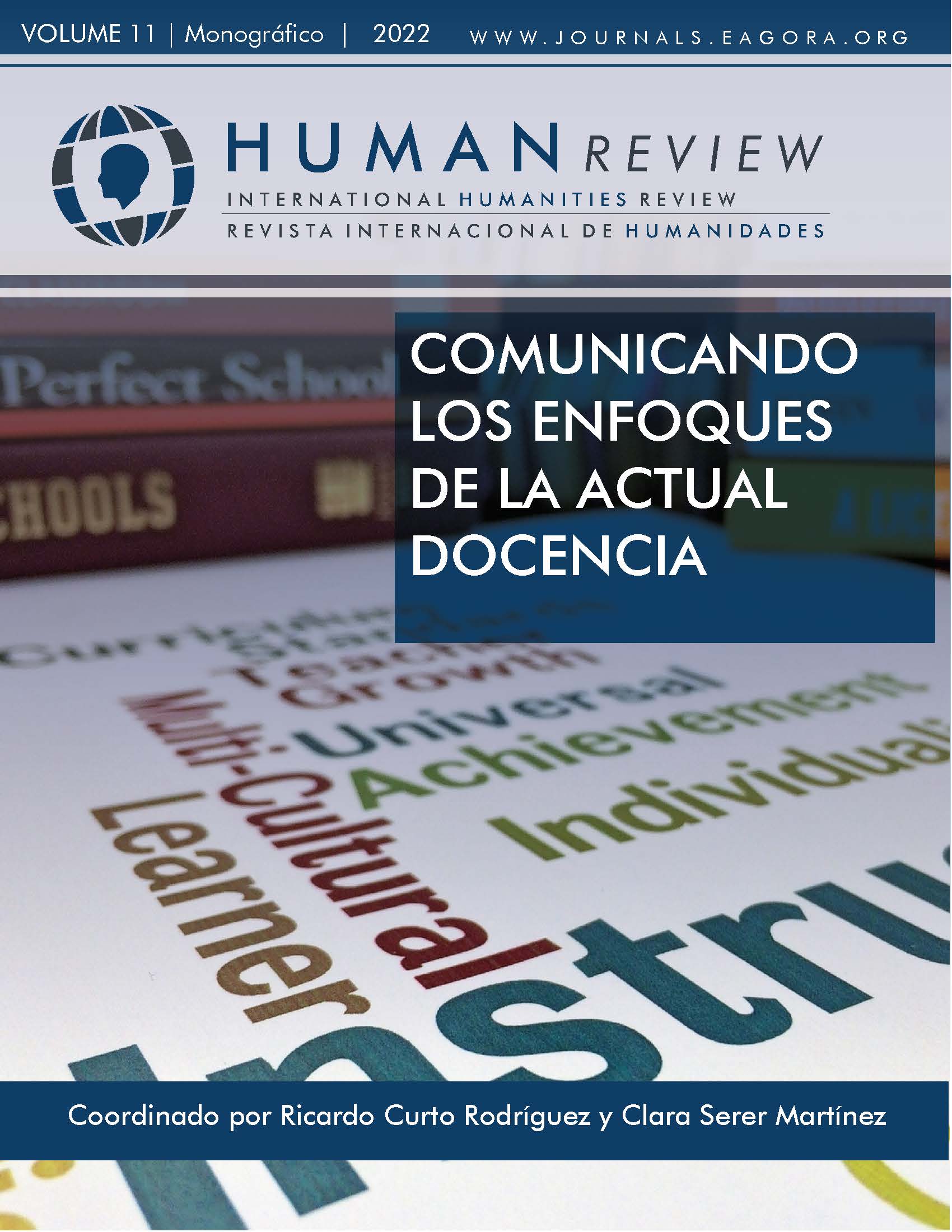Criterios de evaluación y retroalimentación formativa: perspectivas docentes
DOI:
https://doi.org/10.37467/revhuman.v11.3875Palabras clave:
Criterios, Calidad, Aprendizaje, Negociación, Autonomía, Retroalimentación, DocentesResumen
Este trabajo examina diferentes perspectivas docentes para externalizar criterios de evaluación. Se presentan hallazgos de una investigación doctoral que abordan, por una parte, una metodología analítica, que cautela la claridad y transparencia en la comunicación de criterios, segmentando la meta de aprendizaje en pequeñas secuencias, transmitiendo de este modo una idea atomizada acerca del conocimiento. Por otra parte, se explora una visión más holística, sustentada en la interdependencia de los criterios de evaluación, favoreciendo la comprensión del propósito de la tarea en su conjunto. Se analiza la significancia de estos enfoques para la retroalimentación y evaluación formativa.
Citas
Alexander, R. J. (2008) Towards Dialogic Teaching. Rethinking classroom talk. Dialogos.
Berg, B. & Lune, H. (2012). Qualitative Research Methods for the Social Sciences. Pearson.
Black, P. & Wiliam, D. (1998). Assessment and Classroom Learning. Assessment in Education. Principles, Policy & Practice, 5(1), 7–74. DOI: https://doi.org/10.1080/0969595980050102
Black, P. & Wiliam, D. (2003). In praise of educational research: Formative assessment. British Educational Research Journal, 29(5), 623-637. DOI: https://doi.org/10.1080/0141192032000133721
Black, P. & Wiliam, D. (2009). Developing a Theory of Formative Assessment. Educational Assessment Evaluation and Accountability, 21, 5–31. DOI: https://doi.org/10.1007/s11092-008-9068-5
Black, P., Harrison, C., Lee, C., Marshall, B. & Wiliam, D. (2003). Assessment for Learning: Putting it into Practice. Open University Press.
Black, P. & Wiliam, D. (2012). Developing a Theory of Formative Assessment. In J. Gardner (Ed.) Assessment and Learning (Assessment in Education) (pp. 206-229). SAGE Publications. DOI: https://doi.org/10.4135/9781446250808.n13
Bloom, D., Power Carter, S., Beth Morton, C., Madrid, S., Otto, S.; Shuart – Faris, N. & Smith, M., (2008). On Discourse Analysis in Classrooms. Approaches to Language and Literacy Research. Columbia University.
Bloom, D., Beirle, M., Grigorenko, M. & Goldman, S. (2009). Learning over time: uses of intercontextuality, collective memories, and classroom chronotopes in the construction of learning opportunities in a ninth-grade language arts classroom. Language and education, 23(4), 313-334. DOI: https://doi.org/10.1080/09500780902954257
Cohen, L., Manion, L. & Morrison, K. (2011). Research Methods in Education (seventh ed.). Routledge.
Charmaz, K. (2006). Constructing grounded theory: A practical guide through qualitative research. Sage Publications Ltd.
Hammersley, M. & Atkinson, P. (2007). Ethnography.Taylor & Francis Group. DOI: https://doi.org/10.1002/9781405165518.wbeose070
James, M. (2006) Assessment, Teaching and Theories of Learning, in J. Gardner (ed.) Assessment and Learning, (first edition) (pp. 47-60). SAGE Publications.
Kvale, S. & Brinkmann, S. (2009). Interviews: Learning the craft of qualitative research (second ed.). SAGE Publications.
Mansell, W., James, M. & the Assessment Reform Group. (2009). Assessment in Schools. Fit for purpose? A commentary by the teaching and Learning Research Programme. Economic and Social Research Council, Teaching and Learning Research Programme.
Marshall, B. (2004). Goals or horizons-the conundrum of progression in English: or a possible way of understanding formative assessment in English. The curriculum Journal, 15(2), 101-113. DOI: https://doi.org/10.1080/0958517042000226784
Marshall, B. & Drummond, J. (2006) How teachers engage with assessment for learning: lessons from the classroom. Research Papers in Education, 21(2), 133- 149. DOI: https://doi.org/10.1080/02671520600615638
Mason, J. (2002). Qualitative Researching (second ed.). SAGE Publications.
Mercer, N. (2000) Words and Minds. How we use language to think together. Routtledge.
Perrenoud, P. (1998). From Formative Evaluation to a Controlled Regulation of Learning Processes. Towards a Wider Conceptual Field, Assessment in Education. Principles, Policy & Practice, 5(1), 85–102. DOI: https://doi.org/10.1080/0969595980050105
Sadler, D. R. (1989). Formative Assessment and the Design of Instructional Systems. Instructional Science, 18, 119–144. DOI: https://doi.org/10.1007/BF00117714
Sadler, D. R. (2007). Perils in the meticulous specification of goals and assessment criteria. Assessment in education: Principles, Policy & Practice, 14(3), 387-392. DOI: https://doi.org/10.1080/09695940701592097
Sadler, D. R. (2010). Beyond feedback: developing student capability in complex appraisal. Assessment & Evaluation in Higher Education, 35(5), 535-550. DOI: https://doi.org/10.1080/02602930903541015
Silverman, D. (2011). Interpreting Qualitative Data (fourth ed.). London: SAGE Publications Ltd.
Swaffield, S. (2011). Getting to the heart of authentic Assessment for Learning. Assessment in Education: Principles, Policy & Practice, 18(4), 433-449. DOI: https://doi.org/10.1080/0969594X.2011.582838
Torrance, H. & Pryor, J. (1998). Investigating Formative Assessment. Teaching, Learning and Assessment in the classroom. Open University Press.
Torrance, H. & Pryor, J. (2001). Developing Formative Assessment in the Classroom: using action research to explore and modify theory. British Educational Research Journal, 27(5), 616-631. DOI: https://doi.org/10.1080/01411920120095780
Yáñez - Monje, V. (2017). Exploring Teachers’ Interpretations of Feedback in Primary Literacy Classroom Settings (Doctoral’s thesis, King’s College London, England). Retrieved from https://kclpure.kcl.ac.uk/portal/en/persons/veronica-yanezmonje(9432e582-108b-489e-9db7-
Descargas
Publicado
Cómo citar
Número
Sección
Licencia
Aquellos autores/as que publiquen con esta revista, aceptan los términos siguientes:
- Los autores/as conservarán los derechos morales sobre la obra y cederán a la revista los derechos comerciales.
- Transcurrido 1 año desde su publicación, la versión del editor pasará a estar en acceso abierto en la web de la editorial, pero la revista mantendrá el copyright de la obra.
- En el caso de que los autores deseen asignar una licencia abierta Creative Commons (CC), podrán solicitarla escribiendo a publishing@eagora.org.








